To deliver on climate goals, companies must strengthen governance: Ramboll study insights show how and why
Robust review and updates are essential to improving the transparent and effective use and uptake of VCMI’s Claims Code of Practice (‘Claims Code’), which was published in June 2023 to incentivize corporate climate leadership. The Claims Code provides step-by-step guidance for companies seeking to make a claim, beginning with the Foundational Criteria, which require companies to:
- Maintain and disclose an annual greenhouse gas emissions inventory;
- Set and publicly disclose science-aligned near-term emission reduction targets, and publicly commit to reaching net-zero emissions no later than 2050;
- Demonstrate progress on financial allocation, governance, and strategy towards meeting near-term emission reduction targets; and
- Demonstrate that a company’s public policy advocacy aligns with the goals of the Paris Agreement and does not represent a barrier to ambitious climate regulation.
These criteria align with the Paris Agreement’s long-term mitigation goals, drawing on best practice guidance developed by leading global initiatives and regulatory frameworks.
In November, VCMI released additional guidance to the Claims Code, enabling companies to make claims about their use of high-quality carbon credits. The development of this guidance involved months of active consultation and stakeholder engagement with more than 150 experts across VCMI’s Stakeholder Forum, Early Adopters Programme, Expert Advisory Group, and Country Contact Group. As part of this process, a thorough review of the existing Foundational Criteria to make a Claim was undertaken, with updates made to strengthen corporate use of the Code.
To inform this review, VCMI commissioned research from Ramboll, a global engineering and management consultancy, related to the Strategy and Governance requirements laid out in Foundational Criterion 3. This criterion encompasses board-level compensation tied to corporate sustainability targets, board-level expertise in climate-related issues, and oversight of these matters.

The research revealed that this discussion is taking place predominantly in the Global North. Of the 18% of companies reporting board-level compensation tied to emissions reductions targets, 77% were headquartered in Europe or North America; disclosure rates in Latin America, Oceania, and Africa were significantly lower.
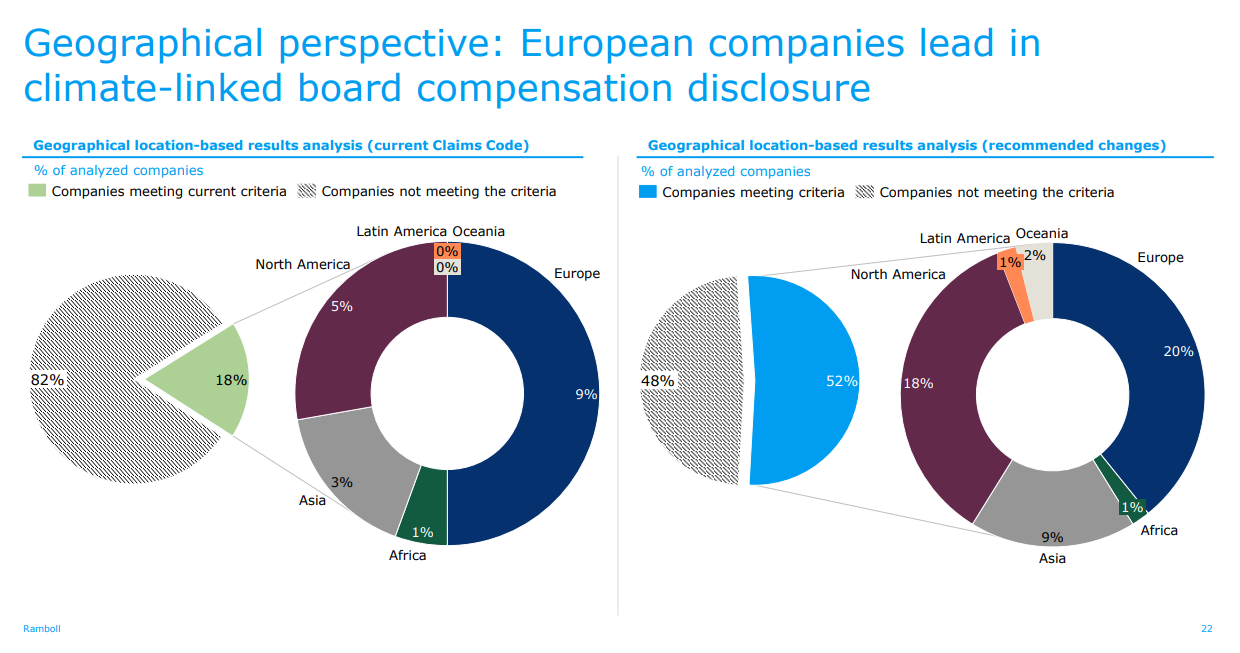
Ramboll, p. 40, November 2023
In this blog post, Sohyeon Park, VCMI’s Technical Associate of Markets and Standards, shares insights into the research and how it has informed VCMI’s Claims Code of Practice.
How did VCMI improve the Claims Code between June and November 2023, and why?
VCMI made improvements to the Claims Code between June and November aimed to enable corporate adoption of the code. VCMI has commissioned research from Ramboll to further investigate governance indicators proposed in the Claims Code.
Ramboll assessed whether the indicators included in Foundational Criterion 3 were adequate to corporate reporting practice, and identified areas for potential improvement. This involved the development of evidence-based governance indicators, benchmarks, and minimum thresholds, as well as clear, transparent definitions and descriptions of relevant terms and methodologies.
“Robust governance that enables regular review and oversight of net-zero transition plans at the management level is crucial to placing climate goals at the forefront of business strategy.”
The study evaluated sustainability reports from 100 companies, across sectors and geographies, which had set science-based targets for 2030. It assessed whether those companies met VCMI’s Strategy and Governance requirement in the Claims Code published in June, which aligned with the UK Transition Plan Taskforce (TPT) and EU Corporate Sustainability Reporting Directive (CSRD).
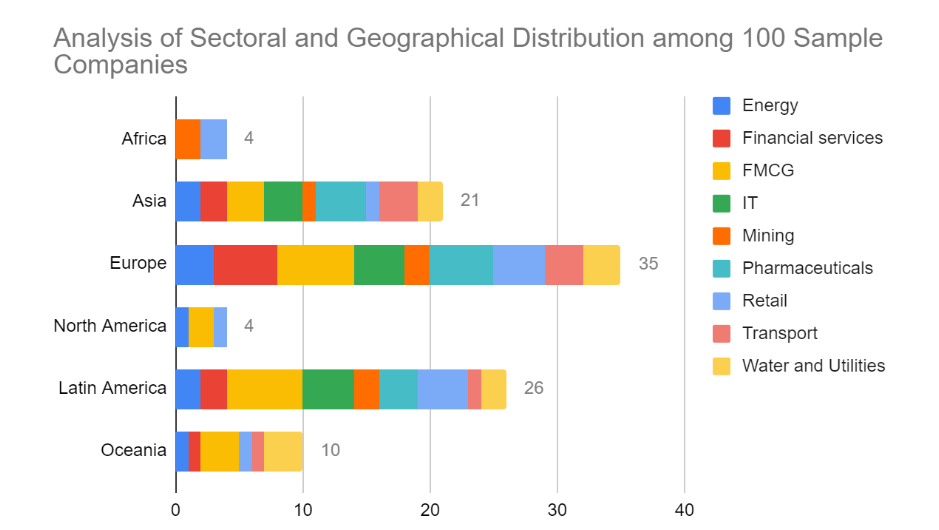
*The chart above is modified from page 9 of the ‘On-track’ indicator development study conducted by Ramboll (November 2023).
This research was essential to incentivising meaningful corporate climate leadership, as governance that enables regular management-level review and oversight of net-zero transition plans is crucial to placing climate goals at the forefront of business strategy.
Can you share some key takeaways from the research?
First, while the majority of companies surveyed – 52% — linked board member compensation to ESG performance and other environmental targets, far fewer – just 18% — offered incentives to board-level members tied specifically to progress on emissions reduction targets. Most companies employed general terms like ‘ESG’ or ‘sustainability’ for board-level compensation incentives, rather than disclosing specific priorities for emissions reduction.
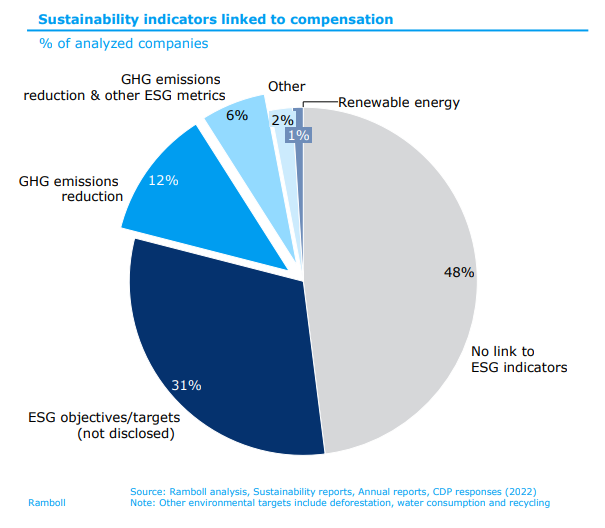
Ramboll, p. 17 , November 2023
Second, while nearly all companies (96%) reported someone responsible for sustainability issues at the board- or management-level, the climate- or sustainability-related expertise of those employees tasked with climate-related issues was unidentifiable due to a lack of data. Board-level experience for addressing climate-related issues is crucial to the effective implementation of corporate climate strategies, and for supporting a company’s long term climate objectives; however, none of the 100 companies surveyed were able to provide that information.
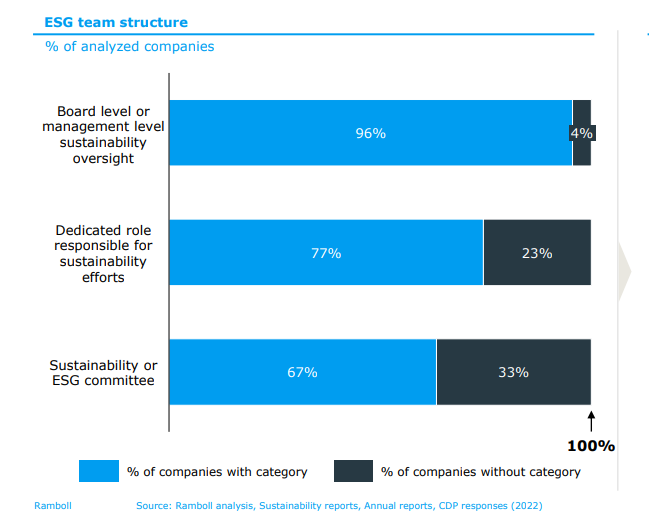
Ramboll, p. 27, November 2023
Although current data is scarce, disclosure will soon become more prevalent and standardized under impending regulation from the EU Corporate Sustainability Reporting Directive (CSRD) and UK Transition Plan Taskforce (TPT), expected to take effect in 2026.
Lastly, while most (79%) companies conducted board-level reviews on progress towards ESG strategy and targets, respondents did not disclose whether that review specifically included emissions reduction targets. The remaining proportion (21%) of companies did not review ESG issues at the board level at all.
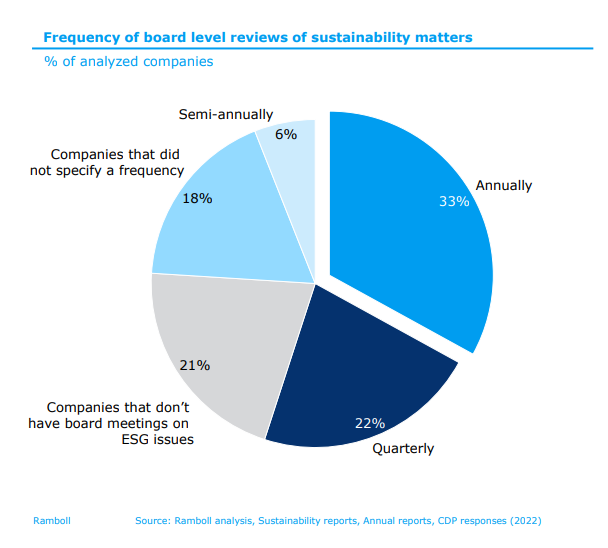
Ramboll, p. 36, November 2023
How did this research inform the Claims Code of Practice?
The research revealed that the requirements laid out in the Claims Code align with reporting standards that many companies are likely to be required to report under, such as the Corporate Sustainability Reporting Directive (CSRD). By implementing the standards provided in VCMI’s Claims Code, companies can confidently prepare for impending regulation from regulatory bodies such as the CSRD.
The Ramboll study recommended that VCMI adopt a phased approach to progressively enhance corporate disclosure over short-term, mid-term, and long-term periods. This would mean applying expanded language in Foundational Criterion 3, such as ‘sustainability’ or ‘ESG,’ in the short- and medium-term, rather than maintaining focus on a company’s progress towards near-term emission targets. VCMI welcomed the recommendations made and looked forward to assessing the proposed approach using the data accumulated from companies as VCMI Claims scale up. However, understanding that maintaining a more stringent approach to governance and strategy requirements – rather than adopting the recommended phased approach — would make obtaining a VCMI Claim more challenging, VCMI elected to maintain the rigor of the Claims Code requirements, seeing an opportunity to strengthen corporate governance systems and drive meaningful emissions reductions.
Strengthening corporate governance practices could include:
- Tying board member compensation to climate target and emissions reduction performance;
- Selecting board and advisory members with technical background in sustainability, Environmental, Social and Governance (ESG), and/or climate change; and
- Adding climate criteria to annual board member reviews.
Ultimately, VCMI used this research to strengthen and specify governance and strategy metrics under Foundational Criterion 3, encouraging corporate climate leadership under the Claims Code of Practice by mandating the disclosure of governance metrics ahead of impending regulation.
What does the future hold?
Global emissions must be nearly halved by 2030 to avoid catastrophic climate change. Despite the urgency of cutting emissions across sectors, corporate governance is not currently strong enough to deliver on net zero goals and to implement climate transition plans at speed and scale.
As the study indicated, less than one-fifth of companies surveyed reported compensation mechanisms to incentivise emissions reductions; board members responsible for oversight of climate-related issues within companies often lacked relevant professional expertise, and the achievement of emissions reduction targets is rarely subject to board-level review.
Yet to raise corporate climate ambition and achieve net zero, robust governance is needed to underpin corporate climate transition plans. Companies must integrate climate issues into core business strategies. Climate goals must be consistently incentivised, monitored, and reviewed among corporate leadership at the board and senior levels.
What can companies do now to get involved and accelerate meaningful climate action?
VCMI encourages all companies to work towards making a Carbon Integrity Claim and get recognized for accelerating global net zero, above and beyond their science-aligned emissions cuts. Companies that demonstrate climate leadership by making VCMI Claims promote industry best practice for governance, disclosure, and use of high-quality carbon credits as part of their net zero strategies.
Ramboll’s research indicated that VCMI’s Claims Code is a step ahead of regulation. Companies making VCMI Claims can be recognized as early adopters of regulatory disclosures, future-proofing their business from impending regulation and other standards such as CSRD and ISSB.
As more companies make VCMI Claims, further data will be disclosed under Foundational Criterion 3, providing new insights into best practice for climate governance and allowing VCMI to continue identifying effective benchmarks to accelerate the pace of decarbonization. VCMI will also continue to closely collaborate with climate reporting frameworks to strengthen guidance for corporate climate action and ultimately deliver on net zero goals.
To learn more, companies can tune into VCMI’s Carbon Integrity 101 webinar series, which provides a step-by-step deep dive into VCMI’s Claims Code, with a live Q&A at the end of each session. All recordings and slides are available to view and download on the VCMI website.
Interested parties can also sign up to the VCMI newsletter to stay up-to-date on VCMI’s work and learn about upcoming opportunities to get involved.
About VCMI
The Voluntary Carbon Markets Integrity Initiative (VCMI) is the standard setter for the high-integrity use of carbon credits by companies as part of their net zero transitions. In June 2023, VCMI published the Claims Code of Practice (‘Claims Code’) to incentivize corporate climate leadership; the Claims Code is the go-to guidance for companies on credible claims.
In November, VCMI released additional guidance for the Claims Code, enabling companies to make claims about their use of high-quality carbon credits. This guidance includes a Monitoring, Reporting and Assurance (MRA) Framework, a brand and associated mark for making ‘Carbon Integrity’ Claims, and a beta version of VCMI’s Scope 3 Claim.
From November 2023, companies have all they need to make a VCMI Carbon Integrity Claim and get recognized for accelerating global net zero.
